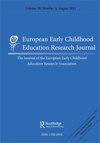The effect of free play on preschoolers’ physical activity level and motor, cognitive, and socioemotional competences: a systematic review of randomized controlled trials
IF 1.8
4区 教育学
Q2 EDUCATION & EDUCATIONAL RESEARCH
European Early Childhood Education Research Journal
Pub Date : 2023-10-03
DOI:10.1080/1350293x.2023.2259641
引用次数: 0
Abstract
ABSTRACTThe present article aims to systematically summarize the effects of free-play (FP) on preschool-aged children’s physical activity (PA) level, and motor (MC), cognitive (CC), and socioemotional competence evaluated through randomized controlled trial (RCT) design. A systematic review of relevant articles was carried out using two electronic databases (PubMed, Web of Science) until 19 October 2022. From a total of 674 studies initially found, 16 were included in the qualitative synthesis. The general outcomes suggest that FP, together other methodologies, may foster MC rather than FP by itself. However, other methodologies have shown greater positive effects than FP for improving PA level, CC, and socioemotional competence. Therefore, the implementation of FP methodology rather than others (e.g. structured play) is not supported by published RCT, at least, when it is not implemented with another methodology.KEYWORDS: Unstructured play; structured playearly childhoodkindergartendevelopment Disclosure statementNo potential conflict of interest was reported by the author(s).自由游戏对学龄前儿童身体活动水平和运动、认知和社会情感能力的影响:随机对照试验的系统回顾
摘要本文通过随机对照试验(RCT)设计,系统总结了自由游戏(FP)对学龄前儿童身体活动(PA)水平以及运动(MC)、认知(CC)和社会情绪能力的影响。使用两个电子数据库(PubMed, Web of Science)对相关文章进行系统综述,直至2022年10月19日。从最初发现的总共674项研究中,有16项被纳入定性综合。一般结果表明,计划生育与其他方法一起,可能会促进管理,而不是计划生育本身。然而,在提高PA水平、CC和社会情绪能力方面,其他方法显示出比FP更大的积极作用。因此,FP方法的实施而不是其他方法(如结构化游戏)不被已发表的RCT所支持,至少当它没有被另一种方法实施时。关键词:非结构化游戏;如:(1)披露声明作者未报告潜在的利益冲突。
本文章由计算机程序翻译,如有差异,请以英文原文为准。
求助全文
约1分钟内获得全文
求助全文
来源期刊

European Early Childhood Education Research Journal
EDUCATION & EDUCATIONAL RESEARCH-
CiteScore
4.20
自引率
8.70%
发文量
70
期刊介绍:
The European Early Childhood Education Research Journal (EECERJ) is the publication of the European Early Childhood Education Research Association (EECERA), an international organisation dedicated to the promotion and dissemination of research in Early Childhood Education throughout Europe and beyond. CREC is the UK base for the European Early Childhood Research Association. EECERA welcomes and encourages membership and contributions from across the world to share and participate in its European perspective. EECERJ aims to provide a forum for the publication of original research in early childhood education in Europe.
 求助内容:
求助内容: 应助结果提醒方式:
应助结果提醒方式:


